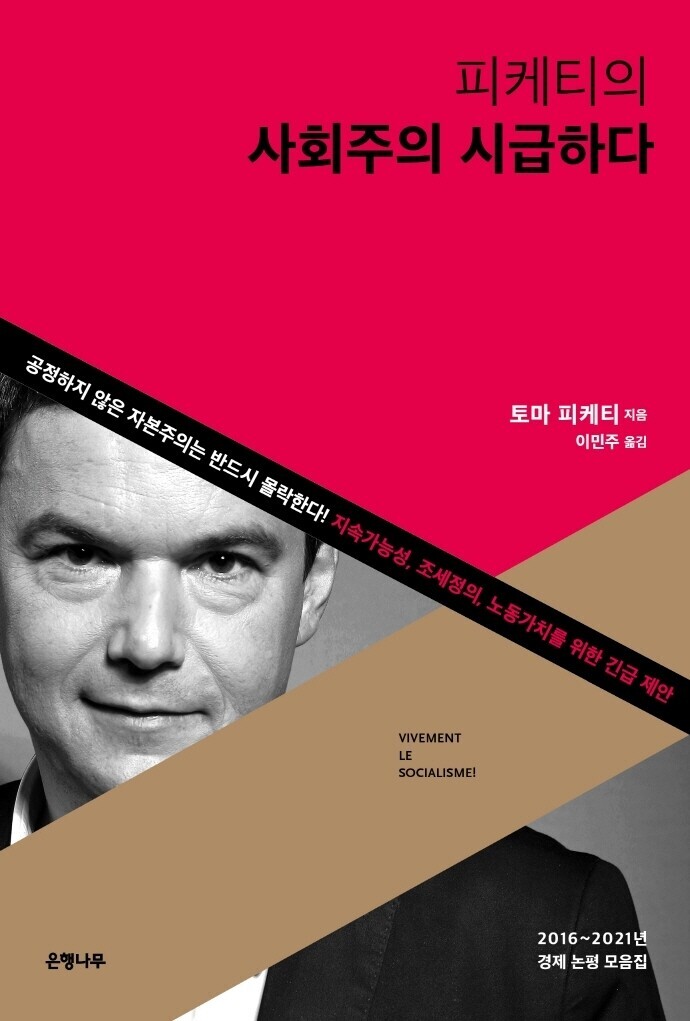hankyoreh
Links to other country sites 다른 나라 사이트 링크
[Book review] What we need now is socialism, Piketty writes

In his book “Capital in the Twenty-First Century,” French economist Thomas Piketty drew upon data from twenty countries around the world over three centuries to expose the roots of inequality, which is the fundamental contradiction of capitalism. Now Piketty offers readers a subversive prospect of socialism.
“If someone had told me back in 1990 that I’d publish a book titled “The Urgency of Socialism” in 2020, I’d have said they were speaking nonsense.”
He delineates that prospect in “The Urgency of Socialism,” a compilation of columns that Piketty has written over the past six years for Le Monde, France’s best-selling daily newspaper.
In the introduction to his book, Piketty recalls being content with his identity as a liberal after witnessing the fall of the Soviet Union in the 1990s, when he was still a student. But after watching capitalism’s reckless pace over the past three decades, he stresses the need to explore other options to find something that can overcome capitalism.

Piketty refers to a new kind of socialism whose ideology is participatory and decentralized, democratic and friendly to the environment, and respectful of women.
“I don’t think any term is more appropriate than ‘socialism’ for referring to an economic system that can serve as an alternative to capitalism. I believe the term ‘socialism’ can be rehabilitated,” he writes.
While this book can be approached more casually than Piketty’s previous works, its subject matter is still heavy. Piketty compares capitalism in the 21st century to a runaway locomotive on the verge of running off the rails.
Befitting his mastery of data analysis, Piketty thumbs through numerous statistics — not only from Western countries such as the US, France, Germany, and the UK, but also from emerging economies including India, Brazil, and Russia — as he shows that capitalism in countries around the world is exacerbating inequality and exhausting the world’s resources.
Furthermore, expanding inequality and the resulting sense of alienation of the working class provokes identity conflict over social class and racial issues. That’s because hate-driven politics is fueled by blaming minority groups for capitalism’s failures.
Piketty concludes that persistent sources of conflict such as Donald Trump’s election as US president, the UK’s withdrawal from the EU, and anti-immigrant sentiment throughout Europe arise from the fact that “no discussion is taking place about economic issues.”
In the end, Piketty’s solution is justice through taxation. He says that income tax systems should be redesigned to be strongly progressive and that wealth taxes should be adopted to enable the state to reclaim personal wealth over the course of decades.
“Income tax should be used as a tool to help reduce inequality between the richest and poorest people in the state, regardless of their regional or occupational identity. The emergence of billionaires should be a temporary phenomenon [that is not inherited].”
Piketty proposes various ways to restore fairness: public funds could be funneled into education to increase productivity while also restoring the ladder of class mobility, and disadvantaged groups could be given “initial property” to provide them with basic occupational options.
He also argues that the wealth gap could be adjusted through basic income and that elderly poverty could be resolved through discussing a greater variety of universal pension plans.
But policies pursued without tax reform are little better than a house built on sand, Piketty stresses. Two case studies in Piketty’s book are the EU, which promised the grand future of a single European market while postponing efforts to establish federal fiscal authority, and India’s political opposition, which has promised universal basic income while staying quiet on how to fund it.
What advice does Piketty have for South Korean President Moon Jae-in, who has sought to build an inclusive welfare state? “Tax reform has always been a crucial companion of great political reforms,” Piketty writes.
By Noh Hyun-woong, staff reporter
Please direct comments or questions to [english@hani.co.kr]

Editorial・opinion
![[Editorial] Yoon must halt procurement of SM-3 interceptor missiles [Editorial] Yoon must halt procurement of SM-3 interceptor missiles](https://flexible.img.hani.co.kr/flexible/normal/500/300/imgdb/child/2024/0501/17145495551605_1717145495195344.jpg) [Editorial] Yoon must halt procurement of SM-3 interceptor missiles
[Editorial] Yoon must halt procurement of SM-3 interceptor missiles![[Guest essay] Maybe Korea’s rapid population decline is an opportunity, not a crisis [Guest essay] Maybe Korea’s rapid population decline is an opportunity, not a crisis](https://flexible.img.hani.co.kr/flexible/normal/500/300/imgdb/original/2024/0430/9417144634983596.jpg) [Guest essay] Maybe Korea’s rapid population decline is an opportunity, not a crisis
[Guest essay] Maybe Korea’s rapid population decline is an opportunity, not a crisis- [Column] Can Yoon steer diplomacy with Russia, China back on track?
- [Column] Season 2 of special prosecutor probe may be coming to Korea soon
- [Column] Park Geun-hye déjà vu in Yoon Suk-yeol
- [Editorial] New weight of N. Korea’s nuclear threats makes dialogue all the more urgent
- [Guest essay] The real reason Korea’s new right wants to dub Rhee a founding father
- [Column] ‘Choson’: Is it time we start referring to N. Korea in its own terms?
- [Editorial] Japan’s rewriting of history with Korea has gone too far
- [Column] The president’s questionable capacity for dialogue
Most viewed articles
- 1Months and months of overdue wages are pushing migrant workers in Korea into debt
- 2[Editorial] Yoon must halt procurement of SM-3 interceptor missiles
- 3Trump asks why US would defend Korea, hints at hiking Seoul’s defense cost burden
- 4[Guest essay] Maybe Korea’s rapid population decline is an opportunity, not a crisis
- 5At heart of West’s handwringing over Chinese ‘overcapacity,’ a battle to lead key future industries
- 61 in 3 S. Korean security experts support nuclear armament, CSIS finds
- 7Fruitless Yoon-Lee summit inflames partisan tensions in Korea
- 8First meeting between Yoon, Lee in 2 years ends without compromise or agreement
- 9[Column] Park Geun-hye déjà vu in Yoon Suk-yeol
- 10South Korea officially an aged society just 17 years after becoming aging society